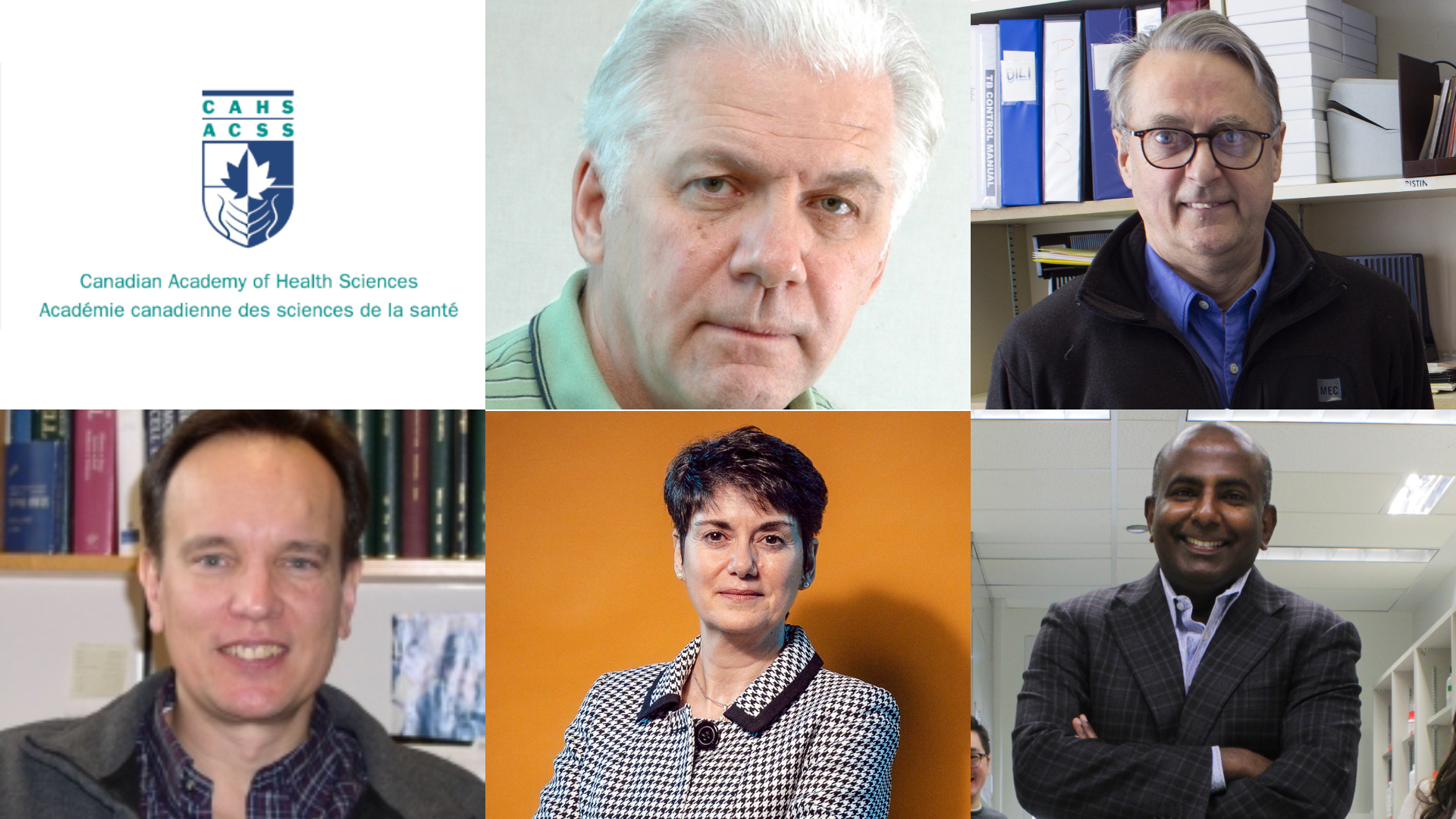Canadian Academy of Health Sciences welcomes five FoMD researchers as new Fellows
Ryan O'Byrne - 22 September 2021

Top row: Dr. Tom Hobman, Dr. Richard Long. Bottom row: Dr. Richard Wozniak, Dr. Vivian Mushahwar and Dr. Gavin Oudit.
Five Faculty of Medicine & Dentistry researchers have received one of Canada’s top honours for health science scholars, joining hundreds of other leading health scientists from across Canada as Fellows at the Canadian Academy of Health Sciences. Tom Hobman, Richard Long, Vivian Mushahwar, Gavin Oudit and Richard Wozniak are the most recent inductees into the academy, and the most inductees from the faculty at one time since 2014.
As CAHS Fellows, the five will conduct independent, unbiased, evidence-based assessments on critical health challenges affecting Canadians and recommend strategic and actionable solutions. Fellows are selected in a competitive process based on their internationally recognized leadership, academic performance, scientific creativity and willingness to serve.
Meet the Fellows
Tom Hobman - Department of Cell Biology
Hobman, who is a former Canada Research Chair in RNA Viruses and Host Interactions, is focused primarily on how RNA viruses affect host cell processes, including how proteins encoded by these pathogenic viruses alter antiviral signaling, transcriptional activity, alternative splicing, and miRNA regulation. Pathogens studied in the Hobman lab include SARS-CoV-2, the causative agent of COVID-19, HIV, and mosquito-transmitted viruses including Zika, Dengue, West Nile, Chikungunya and Mayaro viruses. The ultimate goal is to develop targets for novel antiviral therapies.
The Hobman lab works extensively with pharma and biotech companies and has filed multiple patent applications related to novel antiviral targets.
Richard Long - Department of Medicine
Long’s primary research interest is tuberculosis (TB), particularly how the disease impacts Indigenous peoples and foreign-born Canadians. His most recent research has focused on the relationship between TB and the social determinants of health. Long’s latest project follows the framework outlined in the World Health Organization’s Patients’ Charter for Tuberculosis Care, which promotes a patient-centred approach and lays out the rights of patients diagnosed with TB. These include the right to participate in decisions around care, and the right to dignity, information, choice and justice.
"I'm very proud and honoured to be inducted in the academy as a Fellow,” said Long. “I think this will be a great opportunity to share my research on a national level and also make a larger impact on how we provide health care to some of Canada's most vulnerable people."
Vivian Mushahwar - Department of Medicine
Mushahwar is a professor of medicine, Canada Research Chair in Functional Restoration and Fellow of the American Institute for Medical and Biological Engineering. She is also the director of the Sensory Motor Adaptive Rehabilitation Technology (SMART) Network. Her work focuses on developing intelligent wearable and implantable neural prostheses that restore mobility and prevent secondary complications. She also focuses on developing creative rehabilitation interventions that are both efficacious and cost-saving. She pioneered the development of micro-implants for stimulating the spinal cord to restore standing and walking after paralysis, as well as the development of the wearable garments, Smart-e-Pants and the Smart Ongoing Circulatory Compressions system, for preventing pressure injuries and deep vein thrombosis, respectively.
Gavin Oudit - Department of Medicine
Oudit holds the Canada Research Chair in Heart Failure and most of his research is focused on delineating the molecular and cellular aspects of heart failure and arrhythmias with the goal of identifying new drug and therapy targets. His research and clinical practice spans many aspects of heart failure, including dilated cardiomyopathy, iron-overload cardiomyopathy, cardiotoxicity from breast cancer chemotherapy, identifying diagnoses and treatment of Fabry disease, discovering biomarkers for heart failure, as well as providing cardiac care to patients with muscular dystrophy. Oudit has dedicated his career to the advancement of cardiovascular medicine and knowledge thereof in provincial, national and international settings through his research, education and clinical practice. He has made several novel discoveries, most recently identifying the key role of the protein ACE2 in COVID-19, and many have translated into clinical trials.
Richard Wozniak - Department of Cell Biology
Wozniak’s research program consists of two general areas of focus. First, his team is using yeast and human cell model systems to identify and characterize the molecular interface between nuclear envelope and chromatin. His work has provided fundamental insights into how a nucleus is reformed following mitosis, the process of a cell dividing to form two identical cells. One interesting byproduct of this research will be an understanding the role of the nuclear envelope in regulating the expression of virulence genes in pathogenic yeast, and the potential to exploit this mechanistic information for the purpose of developing novel approaches to treating fungal diseases.
His second focus is exploring the role of nuclear envelope proteins in viral infections. His lab has shown that infection with plus-strand RNA viruses (including hepatitis C and Zika) causes redistribution of several nuclear envelope proteins to cytoplasmic membranes, suggesting they contribute to the compartmentalization of viral replication. Recently, his team has also made important contributions to our understanding of how the SARS CoV-2 virus targets a host cell's nuclear transport machinery for the purpose of inhibiting its innate immune response.